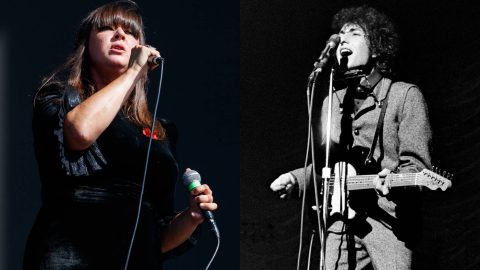
UK Culture Secretary Oliver Dowden has argued that the EU was “letting down music on both sides of the Channel” regarding the recent Brexit deal and its impact on touring artists, while arguing that “it doesn’t have to be final” and that a solution can be found.
Boris Johnson’s post-Brexit trade deal with the EU saw workers from some professions being allowed to travel on business without the need to apply for a visa. However, musicians and their crew were not covered in the deal, adding huge costs to future tours of the continent – which would prevent rising and developing UK talent from being able to afford to do so, creating a potential “glass ceiling” and threatening the stability of the £5.8billion music industry.
Last month, a petition calling for Europe-wide visa-free touring for musicians was launched. Responding to the criticism, a government spokesperson blamed the EU and told NME that they had rejected their proposals, before last weekend saw reports emerge that a “standard” proposal that would exempt performers from needing a visa to enter countries in the EU for trips under 90 days was actually turned down by the UK government.
The government denied this, before adding that their “door remains open should the EU change its mind” over plans to allow musicians and their crew to tour Europe visa-free.
Now in a lengthy response supplied exclusively to NME, Mr Dowden has doubled down on claims that “some of the reporting has been inaccurate”, while arguing that “your Government fought to get a good deal for British music precisely because we recognise how valuable this industry is to the country”.
Elaborating on the “more ambitious agreement” that they pushed for, he said: “We sought a mutually beneficial agreement that would have allowed performers to continue working and perform across the continent without the need for work permits. Musicians, artists, entertainers and support staff would have been captured through the list of permitted activities for short-term business visitors. This was a straightforward solution for our creative industries which would have benefited all sides.
“But the EU turned it down, repeatedly. It did not propose and wouldn’t accept a tailored deal for musicians and artists. I’m afraid it was the EU letting down music on both sides of the Channel – not us.”
Mr Dowden added that while the “outcome is regrettable, it doesn’t have to be final”, and encouraged further negotiation in order to “make it as straightforward as possible for UK artists to continue putting on performances across the continent”.
“The treaty we negotiated has a review clause that allows us to revisit the list of permitted activities for short-term business visitors, but we shouldn’t have to wait for that if both sides can agree sooner to do the right thing for our talented artists,” he continued. “I’ll be making that point to my counterparts in Europe and I hope they change their minds.”
Read Mr Dowden’s commentary in full below.

Mr Dowden wrote:
“There’s been a lot of speculation about musicians and EU visas over the last few days. Given that some of the reporting has been inaccurate, I wanted to take the opportunity to clear a few things up, as I recognise it’s causing a lot of concern.
“Your Government fought to get a good deal for British music precisely because we recognise how valuable this industry is to the country.
“Some reports have suggested we turned down a bespoke arrangement from the EU to allow musicians to work and perform across the bloc. In reality, it was the other way round.
“As negotiations began, we consulted extensively with the sector to find out what they needed from the negotiations. We listened to the experts in British music, including bodies like UK Music and the Musicians Union, and reflected their views in our proposal to the EU.
“We sought a mutually beneficial agreement that would have allowed performers to continue working and perform across the continent without the need for work permits. Musicians, artists, entertainers and support staff would have been captured through the list of permitted activities for short-term business visitors. This was a straightforward solution for our creative industries which would have benefited all sides.
“But the EU turned it down, repeatedly. It did not propose and wouldn’t accept a tailored deal for musicians and artists. I’m afraid it was the EU letting down music on both sides of the Channel – not us.
“This outcome is regrettable but it doesn’t have to be final. Our door is still open, should the EU change its mind. The treaty we negotiated has a review clause that allows us to revisit the list of permitted activities for short-term business visitors, but we shouldn’t have to wait for that if both sides can agree sooner to do the right thing for our talented artists. I’ll be making that point to my counterparts in Europe and I hope they change their minds.
“For now, the UK remains open for musicians to tour here, as it has always been. Artists, musicians, and entertainers from the EU don’t need a visa to give performances, take part in competitions or promotional activities. If they get paid, they can stay for up to one month, and if they are only claiming expenses or prize money, they can stay for up to six months. And though the situation has changed, we’re trying to make it as straightforward as possible for UK artists to continue putting on performances across the continent. Some EU member states, such as France, already allow musicians from outside the EU to perform in their countries with minimal bureaucracy and those rules will apply to UK musicians as well.
“Of course at the moment, the ongoing pandemic means there isn’t a lot of touring taking place. But we’re taking unprecedented action to help make sure the music sector emerges strongly from this crisis. We’ve provided £1.5billion of direct support for arts across the UK, the biggest one off investment ever, and a sum that far exceeds what’s been provided in other countries. That builds on billions more coming from furlough, the self-employed income support scheme and other government support.
“That’s helped save hundreds of music venues around the country from permanent closure – from icons of the British music scene like the Cavern Club and Fabric, to smaller venues like The Troubadour and Manchester’s Night and Day Café.
“But it’s not just about bricks and mortar: companies of musicians from the London Symphony Orchestra to Opera North have benefited, as have festivals like Truck Festival and End Of The Road, as well as those who make it all happen behind the scenes, like the famous Shangri-La Glastonbury or Lights Control Rigging Ltd, which provides equipment and services for some of the UK’s biggest artists. This money has helped keep culture going throughout the pandemic and kept work flowing to the freelancers that the industry depends on.
“We know just how vital the music business is to British life and we’re doing everything we can to support it through the worst crisis we’ve had in any of our lifetimes.
“In the end, we know that artists and musicians just want to perform. We’re doing everything we can to make that a reality – both in the UK and abroad.”
NME has contacted the European Commission for a response. After the deal was struck, while highlighting what business travel visa allowances had been made a European Commission spokesperson told NME: “The UK has chosen to no longer allow the free movement of EU citizens to the UK. It also refused to include a chapter on mobility in the Agreement.
“These choices inevitably mean that business travel between the EU and the UK will no longer be as easy as it currently is.”
Arguing that visa-free travel for artists and crew was mutually beneficial for both the UK and the EU, music industry bosses spoke out to claim that there was now “no excuse” for not finding a solution.
This week has also seen music industry insiders amplify their fears that the current Brexit deal could also prevent UK artists from being able to play in the US, claiming that if talent is unable to acquire “international recognition” through the usual channel of playing neighbouring European countries with ease, then this could make them ineligible for a visa.
- READ MORE: “It’s going to be devastating” – here’s how Brexit will screw over British touring artists
Having attracted support from the likes of Foals, Dua Lipa, Biffy Clyro, Tim Burgess, Garbage and many, many more while surpassing over 250,000 signatures, the “Europe-wide visa-free” petition will now be considered for a debate in Parliament – while music fans are still being encouraged to sign it as well as write to their MP.
The post Culture Secretary Oliver Dowden: “It was the EU letting down music on both sides of the Channel – not us” appeared first on NME | Music, Film, TV, Gaming & Pop Culture News.





